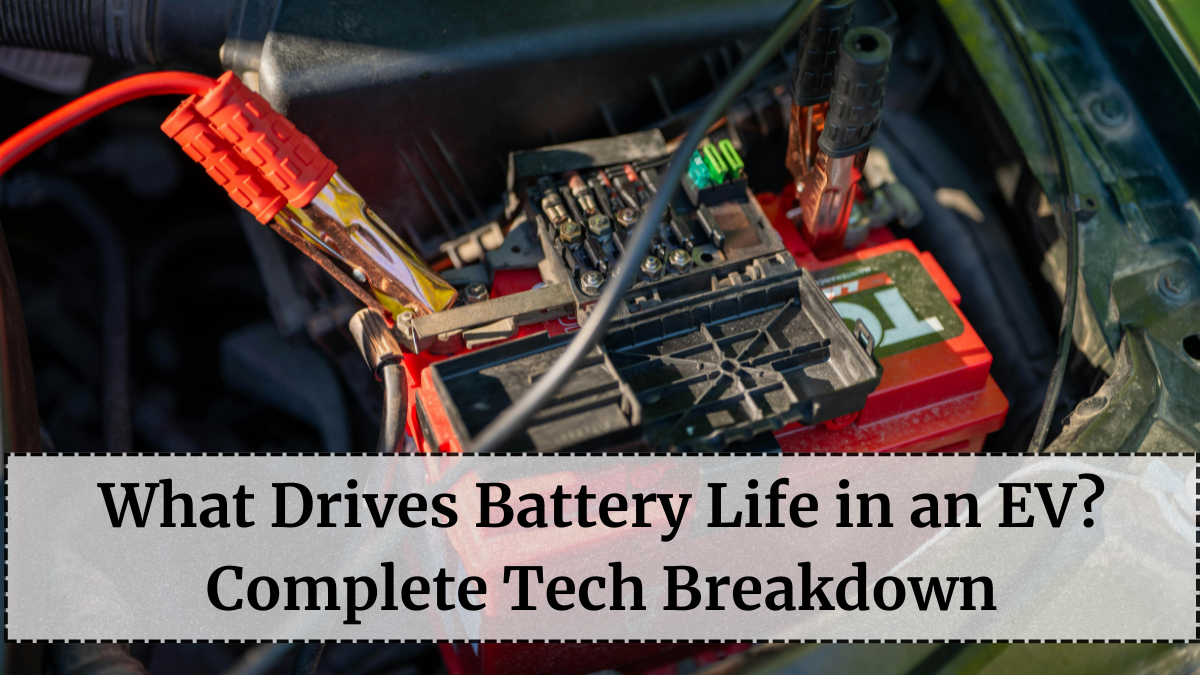Electric Vehicles (EVs) are reshaping the future of mobility, offering cleaner and quieter rides. But the real powerhouse behind every EV is its battery — the core that determines how far, how fast, and how efficiently a car can go. In 2025, as more drivers shift to electric, understanding what drives EV battery life has become essential for both performance and cost efficiency.
This guide explains how EV batteries work, what factors affect their lifespan, and how modern technology is helping them last longer than ever before.

Understanding EV Battery Technology
What Powers an Electric Vehicle?
Most modern EVs use Lithium-ion (Li-ion) batteries, the same type found in smartphones and laptops — but on a much larger and more sophisticated scale. These batteries consist of multiple cells grouped into modules that store and release energy through controlled chemical reactions.
Each battery pack comes with a Battery Management System (BMS) — the brain that monitors temperature, voltage, and charge cycles to keep everything balanced and efficient.
Battery Chemistry Advancements
In 2025, automakers are investing heavily in new chemistries such as:
-
Lithium Iron Phosphate (LFP): Known for durability and safety, widely used in budget-friendly EVs.
-
Nickel Manganese Cobalt (NMC): Offers higher energy density, ideal for long-range models.
-
Solid-State Batteries: The upcoming breakthrough with faster charging, higher energy capacity, and improved safety.
These innovations aim to extend battery life while reducing degradation and charging time.
Factors That Affect EV Battery Life
1. Charging Habits
One of the biggest influences on battery life is how you charge your EV. Frequently charging to 100% or letting the battery drop below 10% can accelerate wear.
Ideal practice: Keep your battery between 20% and 80% for daily use and use fast chargers sparingly, as they generate more heat, which affects long-term health.
2. Temperature and Climate
Extreme heat or cold can significantly impact battery performance. In hot weather, batteries tend to degrade faster, while in freezing temperatures, range temporarily drops due to slower chemical reactions.
Modern EVs use thermal management systems that regulate temperature automatically, maintaining optimal performance regardless of weather.
3. Driving Patterns
Aggressive acceleration, high-speed driving, and frequent stop-and-go traffic can all stress your EV’s battery. Smooth driving with consistent speed helps maintain temperature and power balance, extending lifespan.
4. Charging Infrastructure and Power Quality
Poor-quality chargers or unstable grid connections can lead to inconsistent voltage, affecting battery efficiency. Using certified and manufacturer-approved chargers ensures consistent performance and longevity.
5. Battery Management System (BMS) Efficiency
The BMS is responsible for balancing cells, preventing overcharging, and controlling temperature. A well-calibrated BMS can improve battery life by up to 20% by optimizing charging and discharging cycles.
How Technology Is Extending Battery Life
AI-Based Battery Monitoring
In 2025, EV manufacturers are integrating Artificial Intelligence to analyze driver behavior, environmental data, and charging patterns. AI-powered systems predict battery degradation and adjust power output to ensure even wear across cells.
Regenerative Braking
This feature converts kinetic energy from braking into electrical energy, sending it back to the battery. It not only boosts efficiency but also reduces the number of full charge cycles, indirectly improving lifespan.
Fast-Charging Algorithms
Modern EVs use smart charging algorithms that adjust current and voltage dynamically during charging. This minimizes heat buildup and reduces chemical stress on battery cells, extending long-term health.
Cloud Connectivity and Predictive Maintenance
Connected EVs can now transmit live battery health data to cloud servers. Automakers analyze this data to recommend optimal charging schedules or issue updates to improve performance through Over-the-Air (OTA) software enhancements.
How Long Do EV Batteries Last in 2025?
The average EV battery today lasts 8 to 12 years or 150,000–300,000 km, depending on usage and climate. Leading manufacturers like Tesla, Hyundai, and Tata Motors offer 8-year warranties, showing growing confidence in long-term durability.
With advancements in materials and BMS design, many experts believe that EV batteries launched in 2025 could last up to 15 years before significant capacity loss.
Best Practices to Extend Your EV’s Battery Life
Maintain Moderate Charge Levels
Avoid charging fully unless necessary for long trips. Daily charging up to 80% is ideal for longevity.
Park Smartly
Whenever possible, park your EV in shaded or covered areas to minimize temperature fluctuations.
Use Eco or Normal Drive Mode
These modes regulate power output and reduce stress on the battery, especially during city driving.
Update Software Regularly
Manufacturers release periodic software updates that enhance battery performance, optimize energy flow, and fix efficiency bugs.
Plan Charging Strategically
Avoid frequent use of DC fast chargers; rely on AC home charging for everyday needs.
The Future of EV Battery Innovation
By 2030, the shift toward solid-state and sodium-ion batteries is expected to revolutionize energy density and charging speed. These new batteries will last longer, charge faster, and operate efficiently in all climates.
Additionally, recycling technologies are advancing, allowing 95% of EV battery materials — including lithium and cobalt — to be reused for new production. This will make electric mobility more sustainable and cost-effective in the coming decade.
FAQs
How long does an EV battery last?
Most EV batteries in 2025 last 8–12 years, with new models expected to exceed 15 years under proper maintenance.
Does fast charging damage the battery?
Frequent fast charging can slightly accelerate wear, but using it occasionally is safe thanks to improved heat management systems.
Can I replace my EV battery after a few years?
Yes. Replacement costs have dropped significantly, and many automakers now offer battery upgrade programs for older models.
What temperature is best for EV battery performance?
EV batteries perform best between 15°C and 30°C. Thermal systems help maintain this range automatically.
How can I check my EV’s battery health?
Use your car’s built-in Battery Health Monitor or companion mobile app to track performance, capacity, and charge efficiency.
Click here to know more.
